
Recent US elections brought the two names of Trump and Biden to the forefront of discussion even in China, where many companies and applicants are attempting to ride the wave of popularity and register the names as trademarks.
This is also an opportunity to revisit the legal provisions of name rights and protections. According to Article 32 of Trademark Law, “The trademark application shall neither infringe upon another party's prior existing rights…” The existing prior rights of others include-font size rights, copyrights, patent design rights, name rights, portrait rights, commercialization rights, and other legal prior rights that should be protected.
Related, the Trademark Review Standards clearly state that without express permission, if another person’s name is applied for trademark registration, which may cause damage to the name rights of that person, the disputed trademark shall not be approved for registration or be ruled invalid. The names of others may include their real names, pen names, stage names, aliases, etc.
The specific applicable requirements are as follows:
• In the understanding of the relevant public, the disputed trademark text points to the owner of the name;
• The registration of the disputed trademark may cause damage to the name rights of others.
Additionally, Article 10 item 8 of the Trademark Law states that “Those detrimental to socialist morals or customs, or having other unhealthy influences” are forbidden from being registered & used as a trademark. The application for registration of the names of political, economic, cultural, religious and other public figures may be considered as part of the “other unhealthy influences” mentioned above.
A quick scan of the China Trademark database using Kangxin IP Platform returns the following results when searching for Trump’s and Biden’s names as trademarks.
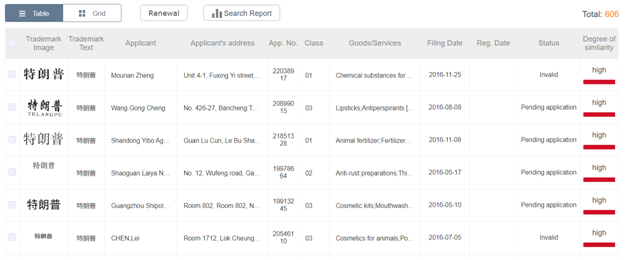
Searching using one transliteration of Trump’s name, 特朗普 (telangpu), returns a total of 606 marks recorded in China, of which 450 are registered and active. President Trump’s own filings are in classes consistent with his line of business – real estate services, including golf courses and restaurants, as well as classes which cover clothing. Most marks bearing resemblance to the President’s name in Chinese are registered by other parties prior to the 2016 presidential election. Other similar marks either omit one character from the President’s name or change the order of the characters, making it more difficult to ascertain whether the mark was made in reference to the popular name.

Marks filed in any class after 2015, when Donald Trump announced his bid to run in the presidential election, were mostly refused by the authorities –
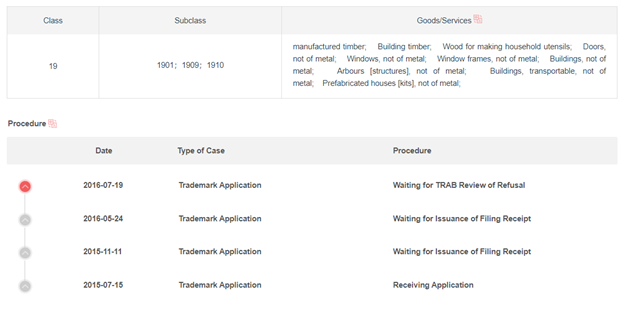
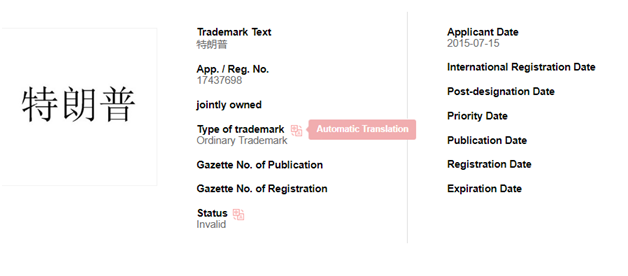
Trump’s name has two popular transliterations – the above 特朗普 (telangpu) and 川普 (chuanpu) – take your pick for which one sounds closest to the proper pronunciation!
When searching for 川普, a similar situation emerges -
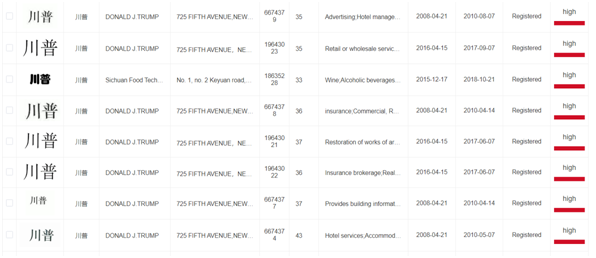
Trump’s team filed for many of the marks in the same classes as 特朗普, but there were a few Chinese third parties which registered the name prior to the US elections, thus securing their rights.
Searching for President-elect Biden’s name returns 438 similar results. A life-long politician with no business interests in China, Biden does not seem to have officially registered his own name as a trademark in China. A search for his name in English does return an image that just this summer was filed for registration and resembles a political logo (likely to be rejected due to the name rights protection provisions).
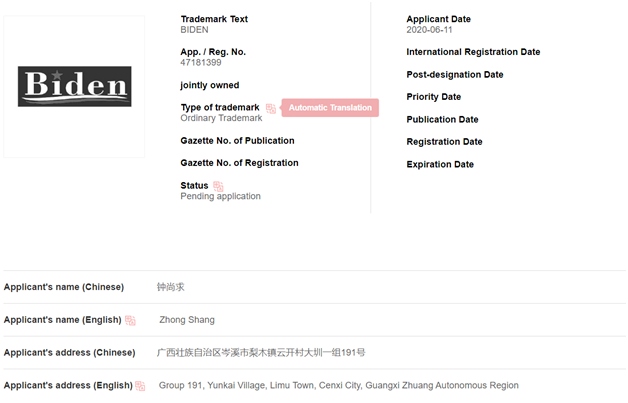
Filings like this one, combining Trump’s and Biden’s name, made during the last few months when the whole world was anticipating the US presidential election, are likely to be rejected as well.
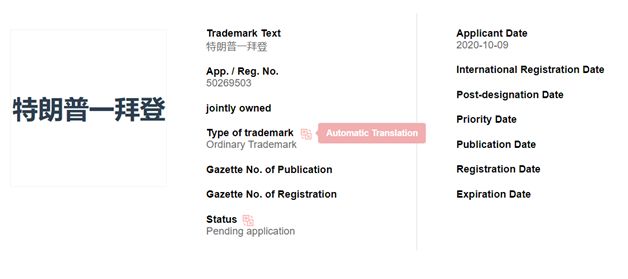
The trends with rejections are clear – when Trump’s name was not well known prior to 2016 election, trademarks with his name were approved for registration in various classes. Since the name was not widely known, there could be no cause for “damage” to the name rights. Since assuming the presidency, Trump’s name became known the world over and thus marks with his name are being rejected for registration. A similar trend is likely to happen to Biden and his name, should anyone attempt to register it.
Certain applicants have appealed the decision of the TRAB to refuse registration of the mark “特朗普”, (Reg.no 22322256) on the grounds that the mark does not violate China’s interests and the provisions laid out in Item 8 of Article 10 of the Trademark Law. The board again refused the registration citing that the registration of the name of the president of the United States is still in violation of Article 10, instead of citing Article 32, which lays out the provisions of name rights protections.
Many celebrities and other high profile individuals have ran into issues with name rights protections in China and elsewhere – but CNIPA adheres to the judgement that the name of the US president is a bit too high stakes to allow registration by others.
(All search data provided by Kangxin IP Platform trademark search service)


Follow us






